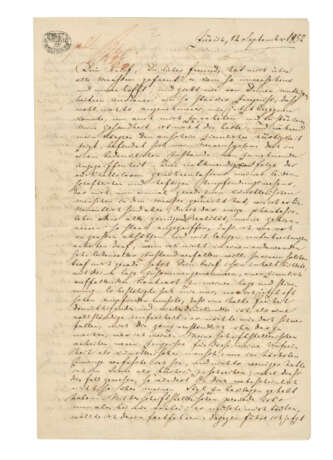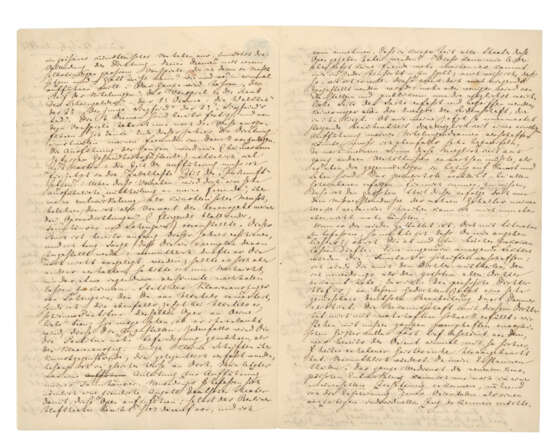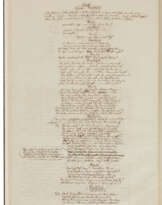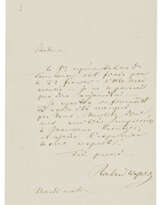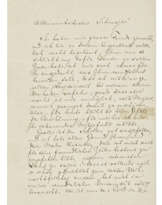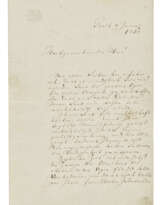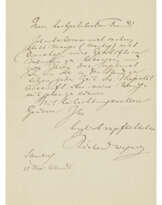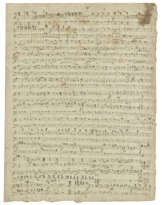ID 1109063
Lot 263 | Richard Wagner (1813-1883)
Valeur estimée
£ 8 000 – 12 000
Autograph letter signed ('Richard Wagner') to August Röckel, Zurich, 12 September 1852
In German. Four pages, 211 x 138mm, bifolium, ink stamp of Waldheim prison and red ink marking at upper left of p.1, presumably of the prison censor. Provenance: Calvin Bullock (1867-1944), and by descent – Christie's New York, 14 May 1985, lot 102.
'What in me is exceptional and peculiar acts like a curse': Wagner announces his intention to embark on the Ring cycle. A welcome letter from Röckel has roused Wagner from a state of near-nervous collapse. 'My health is not of the best, and though physically I appear sufficiently robust, my nervous system is in a very depressed state, gradually growing worse — the result of my self-abandonment to that feverish and excessive sensitiveness, in virtue of which I am the artistic being that I am. The nerves of my brain especially have been so worked upon by this constant dwelling in a world of imagination, with no reality to balance it, that now I am only able to work at long intervals and with frequent breaks'. In fact, Wagner suggests that his 'semi-liberty' is perhaps worse than the complete imprisonment under which Röckel suffers, and declares that he has abandoned literary work. He goes on to make a remarkable announcement of his great artistic project, the Ring: 'I have embarked on a great artistic undertaking, namely, the completion of a poem consisting of three dramas with a separate prologue, which I shall then set to music, and which — God knows when, where and how — I mean some day to have put on the stage. The whole poem will be called The Ring of the Nibelung; the prologue, "The Theft of the Rhine-gold"; the first part of the drama will be "The Valkyries"; the second part, "Young Siegfried"; and the third part, "Siegfried's Death"'. He has completed the dramas: only Rhinegold remains to be put into verse: but the 'working-out' of the project will be a matter of years, and performance even further off. Wagner will send Röckel his published announcement of the project, and will send the full score of Lohengrin to Röckel's wife, together with some others of his publications: she will discover whether she can send them on to him. Performances of Tannhäuser are in preparation in a number of German theatres, but the prospect comes too late to give Wagner pleasure: 'performers and public ... will never realise the energy of passion that underlies it'. But even this unsatisfactory success will not pave the way for a performance of the Ring. Wagner asks whether he can send Röckel books, recommending the works of the Persian poet Hafiz, and concludes with a reiteration of his sense of spiritual crisis, 'more than ever I am painfully conscious that what in me is exceptional and peculiar acts like a curse, separating me from my kind' (quotations in the translation by Eleanor C. Sellar).
Wagner's friendship with August Röckel (1814-1876) dated to the latter's employment as assistant conductor under Wagner at the Dresden Court Theatre for five years from 1843. Röckel's involvement in revolutionary politics during the 1849 Dresden uprising led to his capture alongside Mikhail Bakunin and a 13-year prison sentence in solitary confinement at the Königstein Fortress and Waldheim, during which time he maintained a celebrated correspondence with Wagner. This was the second of Wagner's letters to his friend, after discovering that he was allowed to receive correspondence.
| Artiste: | Richard Wagner (1813 - 1883) |
|---|---|
| Lieu d'origine: | Allemagne |
| Artiste: | Richard Wagner (1813 - 1883) |
|---|---|
| Lieu d'origine: | Allemagne |
| Adresse de l'enchère |
CHRISTIE'S 8 King Street, St. James's SW1Y 6QT London Royaume-Uni | |||||
|---|---|---|---|---|---|---|
| Aperçu |
| |||||
| Téléphone | +44 (0)20 7839 9060 | |||||
| Commission | see on Website | |||||
| Conditions d'utilisation | Conditions d'utilisation |

